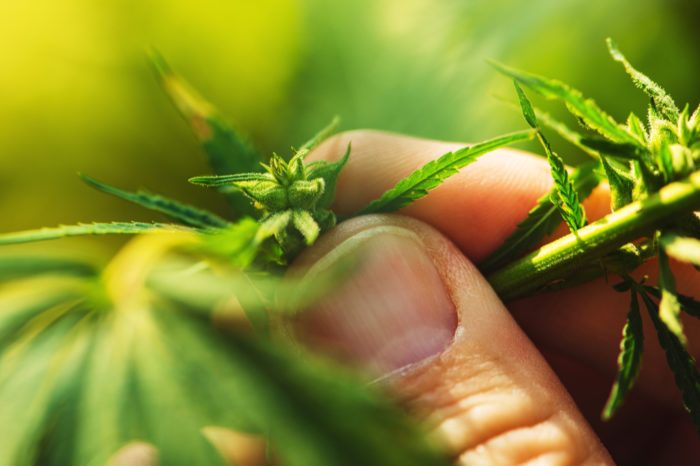This is bad news for those who served in the military and rely on cannabis as medication.
Democrats in the U.S. House caved to the pressure of Senate Republicans and jettisoned two measures that would have improved the legal relationship between veterans and cannabis.
In 2019, the House passed a version of the National Defense Authorization Act (NDAA) that included two measures Republicans didn’t like. The first was an amendment that would have made it illegal for the Department of Veterans Affairs to deny home loans to vets who worked in legal cannabis markets.
The second would have allowed every branch of the military, at its discretion, to grant re-enlistment waives to individuals who had committed one low-level cannabis offense.
These may seem like relatively minor changes, albeit ones that would go a long way toward helping both veterans and cannabis rights advocates. And, individually, it’s hard to find fault with either provision. But taken together, they are more than the sum of their parts.
Rejection of these measures is part of a clear and orchestrated message from right-wing leadership to veterans, telling them to abandon their interests in cannabis. They believe there should be no encouragement for service members to participate in the green industry — even when it’s legal.
Self-Inflicted Bad News for Veterans?
There’s something a bit odd about framing these denials as bad news. After all, U.S. veterans voted overwhelmingly for President Donald Trump in the last election, and continue to support him. Is it possible that many service members view cannabis benefits as a negative — or at least as an issue not important enough to vote on?
That could be. After all, Republicans have a long history of voting against increased help for needy veterans and cannabis laws as well. Mixing both veterans and cannabis in a law seems doomed from the start for conservative law makers.
Not that veterans are singled-out. Conservatives tend to disagree with the social safety net and vote against increasing welfare measures on the whole.
At the same time, there’s very little coherent defense against these specific measures. They’re not expanding the welfare state nor are they increasing the size of government. Allowing former service members to get home loans or re-enlist after a minor possession is not inherently against conservativism.
So why were Republicans against them — and why didn’t Democrats fight harder for them?

Veterans and Cannabis Don’t Mix?
The first measure, which would allow the VA to authorize home loans to veterans who work legal jobs in the cannabis industry, came about after a 35-year-old Army veteran was denied a VA loan in Massachusetts.
After the veteran contacted his representative, others came forward with stories of similar treatment. Ret. Army Maj. Tye Reedy, who earned four Bronze Stars during his eleven years of service amid tours of duty in Iraq and Afghanistan, lost his military pension because he took a job working for a large cannabis company following his time in the service.
Reedy served as director of operations for a medically focused cannabis company. He was in the business of treatment, not recreation — but the military only saw “weed.”
The Judge Advocate General wrote of his case: “A military officer working in the cannabis industry runs contrary to Army values.”
According to the Army itself, its values are: loyalty, duty, respect, selfless service, honor, integrity, and personal courage. Nothing Reedy did ran counter to any of those. In fact, trying to earn money to support a family while helping others gain better access to medicine is a testament to many of the Army’s values.
Clearly, something needs to change regarding veterans and cannabis.
Re-Enlisting After Cannabis Charge
The second provision scrapped to appease Senate Republicans involved allowing service members to re-enlist if they had committed a solitary minor cannabis offense, such as getting caught smoking a joint. Bigger cannabis infractions, like selling weed or trafficking, would still make re-enlistment impossible.
It’s not like this doesn’t happen already. The Army already issues re-enlistment waivers for cannabis consumption — at increasing rates almost every year.
The new measure would have simply added options for dealing with veterans and cannabis offenses; basically, it would mean less paperwork. What’s to oppose?
To be clear, opposition to the re-enlistment requirement isn’t about the text of the measure. It’s about sending a message. Republicans don’t want veterans to think it’s OK to try cannabis, even though it has a range of benefits that are uniquely suited to benefiting vets.
It’s the same reason why Texas cannabis laws excluded veterans with PTSD. The same reason a Republican lawmaker lied about a study on veterans and cannabis. The message from Senate Republicans is clear. They’re not out to support veterans; they’re after control.

Re-Thinking Veterans and Cannabis
While these issues didn’t make it out of the compromising sessions, others were passed in the last Congress. It may be too late for the NDAA, but other pro-cannabis initiatives have momentum.
For example, the SAFE Banking Act, which helps banks finance the cannabis industry by shielding them from federal anti-cannabis laws, passed the House and is now before the Senate. Perhaps Democrats compromised on the veterans and cannabis bills in order to get more votes for banking reform.
And who can forget the 2018 Farm Bill that legalized hemp, leading to the CBD explosion? That one had bipartisan support, thanks to Republican efforts to secure work for needy farmers after Trump’s tariffs made their old cash crops worthless.
Yes, it’s disappointing that Congressional Democrats would abandon such slam-dunk proposals as the recent omissions from the NDAA. But the most pro-cannabis Congress in history has accomplished a lot by compromising with conservatives.
It’s a shame it’s come to that, however. America’s veterans deserve better.





